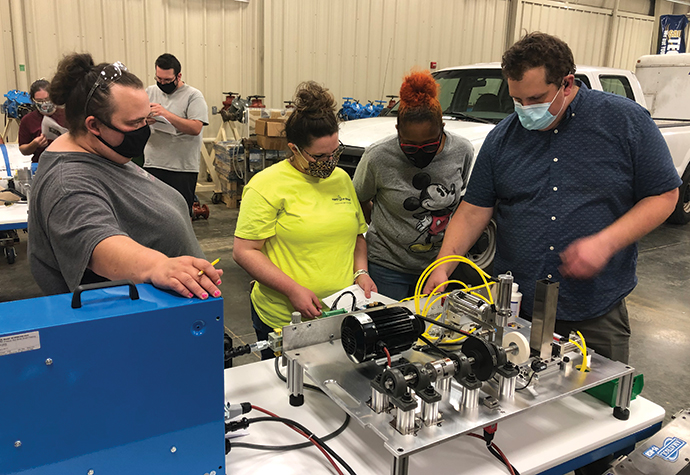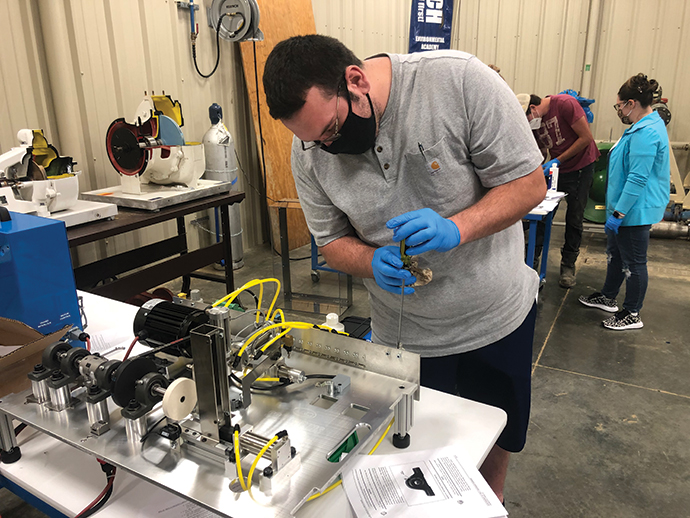Now in its second year, Arkansas’ ambitious “Future Fit” program is helping to provide essential skills to unemployed and underemployed Arkansans to help me the workforce needs of manufacturers.
A project of the Arkansas Economic Development Commission (AEDC) and the Arkansas Office of Skills Development (AOSD), Future Fit is designed to accommodate a diverse group of people; high school graduates who do not plan to enroll in college, military veterans and non-violent offenders among them.
Eight higher-learning institutions, led by the University of Arkansas at Fort Smith, have been selected to deliver Future Fit training, which includes a mix of classroom instruction and hands-on lab work designed in collaboration with manufacturing firms that, to date, have included such companies as Rheem, MAHLE, Trane, Gerber and International Paper.
Steve Sparks, AEDC’s Division Director, Existing Business Resources, says the expanding Future Fit program has been a boon to both workers and employers.
What was the genesis of the Future Fit Program?
STEVE SPARKS: Everyone has heard of the skills gap. In late 2018, we actually brought in 30, 40 companies into one room and asked them all, “Do you have trouble finding people with the skill sets and background in technology that you’re looking for?” And the answer was absolutely, yes. But when we asked them what the gap looked like, it was crickets. They said they know it when they see it.
“We want to make sure that the companies that are here stay here, and that any company that wants to move to Arkansas will have the workforce that will help make them successful.”
How did you take it from there?
SPARKS: Those companies ended up sending me a stack of job descriptions three inches high. We sat down and we were able to break them into three general categories. One was a production operator/assembler kind of role. Next was a mechanical repair role. And then they needed mechatronics-level people who can fix just about anything. But the first two categories were the ones they were screaming for most. So, we took the industry’s information, we engaged Tooling U -SME [a manufacturing training division of SME], and identified what the companies wanted, created a matrix of skills in a format that made sense to them and then worked with the University of Arkansas, Fort Smith to flesh out the classroom material We rolled it back out to the companies and they loved it.
Why did you choose the University of Arkansas, Fort Smith for the launch?
SPARKS: They were hungry for what we were trying to put together and they were receptive to the approach. Their region has a lot of industry and a lot of jobs. We wanted to create this program in such a manner that we could use it anywhere in the state. The diversity of companies we were able to bring into the pilot from the Fort Smith and Russellville areas allowed us to do that. Fort Smith has been doing this for a long time. They were engaged and ready.

What specific skills are being taught?
SPARKS: We knew from the start that we couldn’t create a curriculum that was too specific. We had to have it where it worked for everyone. The companies we worked with to put this together were so varied that we were able to do that. Our entry level class, the production operator/assembler, will fit nearly every company in the manufacturing realm at an entry level role. We intentionally made our curriculum broad enough yet specific enough that our graduates would have all the essential skills they needed to have. Those skills include machine operations, parts assembly, blueprints, tolerances, torque, drawings, quality assurance, standard work orders and power tools among many others. Safety is a big thing for everyone as are teamwork and conflict resolution. Among the companies that are working with us now, we haven’t found any that have needs for entry level people that are any different from what we’ve covered.
How do you tailor Future Fit to accommodate workforce needs as they vary by region?
SPARKS: Our manufacturing mostly follows the interstates and population bases. In the southern half of the state, we have a strong timber industry with associated pulp and fiber. In the northeast, we have a lot of steel. The central part of the state has a hub for aerospace and defense. For entry-level basics, Future Fit covers pretty much covers all of them. After our initial rollout, we bring industry back and ask what they’d like to see covered more in-depth. That’s where it gets into customization for the regions. As we roll out the program to a new area, the first thing we do is to reach out to those companies, bring them together and find out what they need.
What is the connection between Future Fit and Arkansas’s commitment to promoting business retention?
SPARKS: The biggest issue for companies right now is human resources. Companies that can’t find the workers they need will go where they can find them. We call on companies every day, and among the questions we ask them is, “What keeps you up at night.” No. 1 on the list is always finding and maintaining qualified people. If they can’t do that, their production goes down, quality goes down and profitability goes down. We want to make sure that the companies that are here stay here, and that any company that wants to move to Arkansas can have the workforce that will help make them successful.
What kind of feedback have you gotten from participants?
SPARKS: Our participants have really loved it, especially as they’ve finished it. For many, it’s hard, it’s new and it’s different, but in the cases of some it’s been life changing. We have participants who have come out of the justice system. They’ve come from making nothing to making 15 bucks an hour or more. It literally has been life changing. They tell us that the confidence we have shown in them has given them faith and confidence in themselves.

